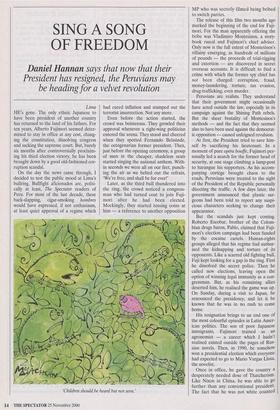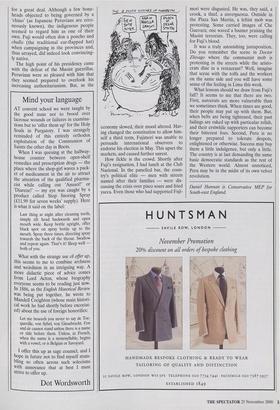SING A SONG OF FREEDOM
Daniel Hannan says that now that their
President has resigned, the Peruvians may be heading for a velvet revolution
Lima HE's gone. The only ethnic Japanese to have been president of another country has returned to the land of his fathers. For ten years, Alberto Fujimori seemed deter- mined to stay in office at any cost, chang- ing the constitution, dissolving congress and sacking the supreme court. But, barely six months after controversially proclaim- ing his third election victory, he has been brought down by a good old-fashioned cor- ruption scandal.
On the day the news came through, I decided to test the public mood at Lima's bullring. Bullfight aficionados are, politi- cally at least, The Spectator readers of Peru. For most of the last decade, these back-slapping, cigar-smoking hombres would have expressed, if not enthusiasm, at least quiet approval of a regime which had cured inflation and stamped out the terrorist insurrection. Not any more.
Even before the action started, the crowd was boisterous. They growled their approval whenever a right-wing politician entered the arena. They stood and cheered when they spotted Fernando Belau-1de, the octogenarian former president. Then, just before the opening ceremony, a group of men in the cheaper, shadeless seats started singing the national anthem. With- in seconds we were all on our feet, punch- ing the air as we belted out the refrain, `We're free, and shall be for ever!'
Later, as the third bull thundered into the ring, the crowd noticed a congress- man who had turned coat to join Fuji- mori after he had been elected. Mockingly, they started tossing coins at him — a reference to another opposition `Children should be heard but not seen.' MP who was secretly filmed being bribed to switch parties.
The release of this film two months ago marked the beginning of the end for Fuji- mori. For the man apparently offering the bribe was Vladimiro Montesinos, a story- book rascal and Fujimori's chief adviser. Only now is the full extent of Montesinos's villainy emerging, as hundreds of millions of pounds — the proceeds of trial-rigging and extortion — are discovered in secret overseas accounts. It is difficult to find a crime with which the former spy chief has not been charged: corruption, fraud, money-laundering, torture, tax evasion, drug-trafficking, even murder.
Peruvians are realists. They understand that their government might occasionally have acted outside the law, especially in its campaign against the Shining Path rebels. But the sheer brutality of Montesinos's methods — and the fact that they seemed also to have been used against the democrat- ic opposition — caused unfeigned revulsion.
At first, the President tried to save him- self by sacrificing his lieutenant. In a moment of pure opera bouffe, Fujimori per- sonally led a search for the former head of security, at one stage climbing a lamp-post to harangue his supporters. As his accom- panying cortege brought chaos to the roads, Peruvians were treated to the sight of the President of the Republic personally directing the traffic. A few days later, the government announced that plastic sur- geons had been told to report any suspi- cious characters seeking to change their appearance.
But the scandals just kept coming. Roberto Escobar, brother of the Colom- bian drugs baron, Pablo, claimed that Fuji- mori's election campaign had been funded by the cocaine cartels. Human-rights groups alleged that his regime had author- ised the kidnapping and torture of its opponents. Like a scarred old fighting bull, Fuji kept looking for a gap in the ring. First he dissolved the secret police. Then he called new elections, leaving open the option of winning legal immunity as a con- gressman. But, as his remaining allies deserted him, he realised the game was up. On Sunday, during a visit to Japan, he renounced the presidency, and let it be known that he was in no rush to come home.
His resignation brings to an end one of the most colourful episodes in Latin Amer- ican politics. The son of poor Japanese immigrants, Fujimori trained as an agronomist — a career which I hadn't realised existed outside the pages of Rus- sian novels. Then, in 1990, he somehow won a presidential election which everyone had expected to go to Mario Vargas Llosa, the novelist.
Once in office, he gave the country a desperately needed dose of Thatcherism• Like Nixon in China, he was able to go further than any conventional president. The fact that he was not white counted for a great deal. Although a few bone- heads objected to being governed by a `chino' (as Japanese Peruvians are erro- neously known), the indigenous people seemed to regard him as one of their own. Fuji would often don a poncho and chullo (the traditional ear-flapped hat) when campaigning in the provinces and, thus arrayed, did indeed look convincing- ly native.
The high point of his presidency came with the defeat of the Maoist guerrillas. Peruvians were so pleased with him that they seemed prepared to overlook his increasing authoritarianism. But, as the economy slowed, their mood altered. Hav- ing changed the constitution to allow him- self a third term, Fujimori was unable to persuade international observers to endorse his election in May. This upset the markets, and caused further unrest.
How fickle is the crowd. Shortly after Fuji's resignation, I had lunch at the Club Nacional. In the panelled bar, the coun- try's political elite — men with streets named after their families — were dis- cussing the crisis over pisco sours and fried yucca. Even those who had supported Fuji- mori were disgusted. He was, they said, a crook, a thief, a sinverguenza. Outside in the Plaza San Martin, a leftist mob was protesting. Some carried images of Che Guevara; one waved a banner praising the Maoist terrorists. They, too, were calling for Fuji's blood.
It was a truly astonishing juxtaposition. Do you remember the scene in Doctor Zhivago where the communist mob is protesting in the streets while the aristo- crats dine in a restaurant? Well, imagine that scene with the toffs and the workers on the same side and you will have some sense of the feeling in Lima this week.
What lessons should we draw from Fuji's fall? It seems to me that there are two. First, autocrats are more vulnerable than we sometimes think. When times are good, their people may put up with them. But, when belts are being tightened, their past failings are raked up with particular relish, and their erstwhile supporters can become their bitterest foes. Second, Peru is no longer prepared to tolerate despots, enlightened or otherwise. Success may buy them a little indulgence, but only a little. The country is at last demanding the same basic democratic standards as the rest of the Western world. Almost unnoticed, Peru may be in the midst of its own velvet revolution.
Daniel Hannan is Conservative MEP for South-east England.






























































































 Previous page
Previous page